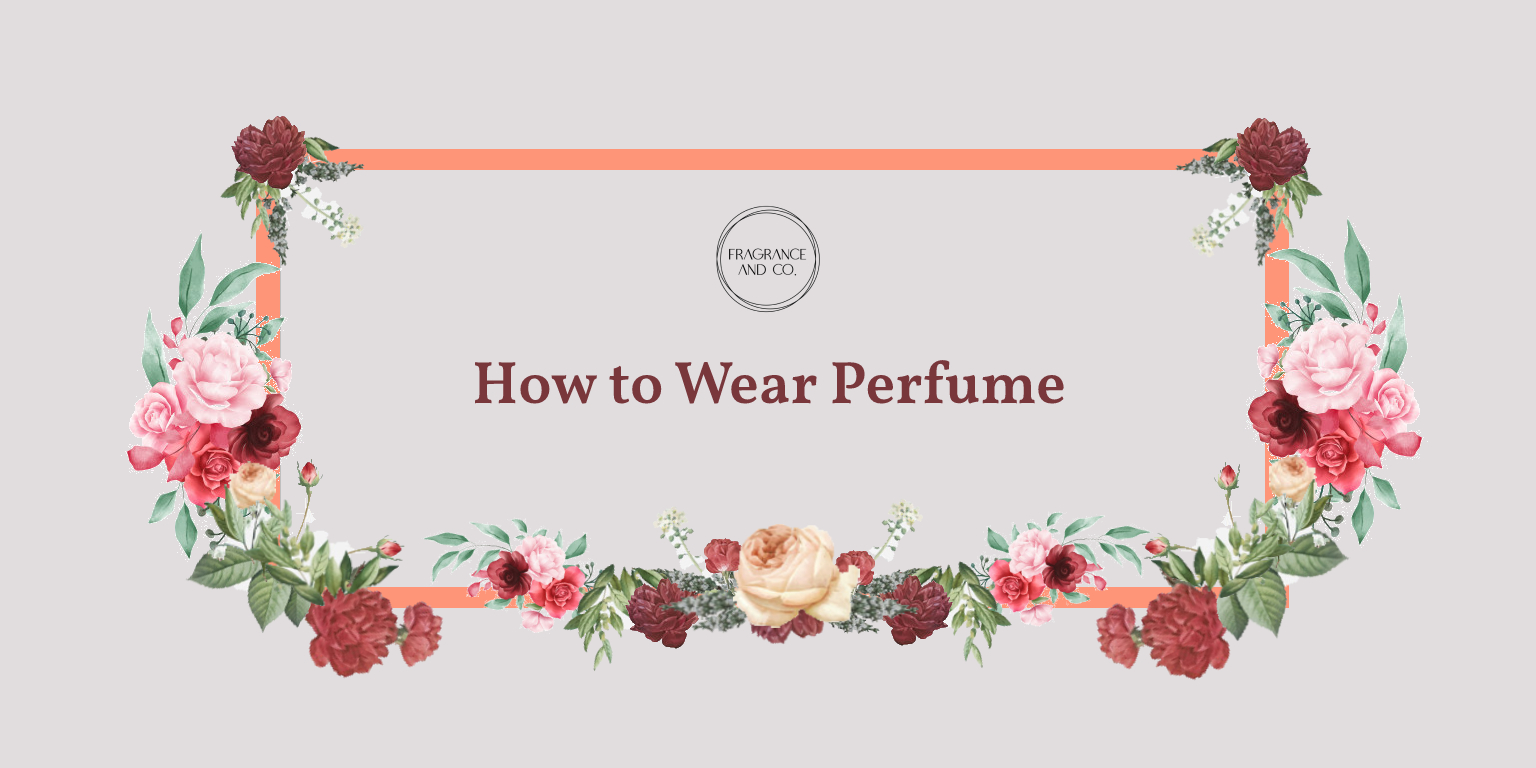Wearing fragrance seems easy — a quick spray, and then you’re off to sashay. However, learning how to wear perfume effectively requires a bit more than that. For this article, we’re going to discover the best way of applying perfume, as well as factors that can enhance the scent.

How to Wear Perfume
To wear perfume properly, spray directly at body parts that produce the most heat. Wait for a few minutes for the fragrance to settle down. It also helps to spray perfume after taking a bath or applying skin-moisturizing products.
These are simple yet effective ways of wearing perfume to make you smell heavenly for the whole day.
Identify Your Pulse Points
The pulse points are parts of the body where blood vessels are closer to the skin. As a result, they produce more heat than any other part and can highlight the fragrance you’re wearing. To make sure you’re applying perfume the right way, choose two or three of these pulse points.
- Ears: If you want to turn heads and make people immediately smell your iconic Chanel perfume, spray or dab some at the back and top sides of the ears. The oilier these parts get, the better they hold your perfume’s scents.
- Collarbone: The neck and collarbone area has ‘dips’ because of the bone structure, giving your perfume a space to settle down on your skin. This is a great spot for spraying your go-to Victoria’s Secret perfumes because you’ll want the signature scent to radiate from your body right away.
- Back: While the back may not be a common area to put perfume, clothes usually cover this part completely, protecting the perfume against air exposure. Spray a couple down your backbone before wearing clothes.
- Wrists: This is the usual spot for wearing perfume because it has a lot of blood flow that can cause heat. Make a direct spray to both wrists and let the fragrance dry down.
- Crook of the arm: We tend to move our elbows a lot, generating heat in the inner side of the elbows. Wait for the perfume to dry down before bending your arms.
- Belly Button: Spray or dab some directly in the belly button. This may be another odd part to put perfume on, although it has a good pulse point. You can better protect the scent if you’re usually wearing clothes that cover the stomach.
- Behind the Knees: Knees also move a lot throughout the day, resulting in better heat generation. As the heat works with fragrances with strong protection, like Versace perfumes, the scent will move up the body. Spray or dab a bit of perfume, then wait for the fragrance to settle down.
Spray Perfume Right After Showering
A perfume needs the perfect texture to unravel itself, and in this case, it’s our skin. The skin has lipophilic properties, causing it to become warm and absorb oils. Likewise, the skin’s surface allows the scent molecules to bind themselves well.
Taking a nice, hot shower opens the pores, letting moisture help the skin lock a perfume’s scent. You can further hydrate your skin by applying unscented moisturizer.
Hold the Bottle Away From the Body
The distance between the bottle and your skin also affects how the fragrance will come out. Positioning the bottle 3 to 6 inches away from the body causes the liquid to become a mist in the air.
Make sure to point the nozzle in the direction of your targeted location. You would know you’re holding the bottle too closely if your skin gets too wet. If you don’t feel much of the mist, it means you’re under-applying.
Moreover, it’s not ideal to walk through a cloud of perfume mist. Doing so would most likely make the mist land on your clothes instead. You might end up spending time removing the perfume smell from your clothes the next day.
Spray Sparingly
You may think that dousing yourself with perfume would make the scent more effective. However, this may cause perfume, even the lightest, summer fragrances, and scents, to come off too strong.
If your perfume has delicate notes, such as vanilla perfumes, make sure not to go beyond six sprays. On the other hand, scents with strong projection, like rose perfume, only require 1 to 3 times of spraying.
If your perfume bottle doesn’t include a spray, you can spill a bit of perfume into the tip of your finger and dab some on your pulse points.
Reapply Perfume if Needed
Some perfume has long-lasting effects, while others tend to have a certain sillage period. You can spray or dab perfume again once or twice a day.
When reapplying, it would be better to keep the large bottle at home and transfer some perfume into another bottle. Oxygen is the natural enemy of perfumes, and exposing a half-used bottle to oxygen causes the scent’s molecules to break down fast.
Other Factors to Consider When Applying Perfume
Part of learning how to wear perfume correctly is knowing what external factors can impact fragrances. Keep these things in mind before spraying.
Perfume Concentration
Skin reacts differently in various perfumes due to its raw materials or perfume oils. Some ingredients may not blend well with your body’s natural oil, driving the scent to fade away even when you’re applying a decent amount of perfume. Hence, it’s essential that you understand perfume concentration.
The level of perfume oil in a fragrance dictates how long the scent will last. The cheapest perfumes and fragrances tend to be more diluted, while other scents have stronger concentration. The concentration categories include:
- Eau Fraiche: This contains 1–3% of perfume oil, making the scent last less than 60 minutes.
- Eau de Cologne: Consists of 2–4% perfume oil with a longevity power of up to 2 hours.
- Eau de Toilette: Comprises of 5–15% perfume oil that can retain aroma for around 3 hours.
- Eau de Parfum: Includes 15–20% perfume oil with a scent that can last for 5 to 8 hours.
- Parfum: Has 20–30% perfume oil, giving you 24-hour scent longevity.
Fragrance Notes
A typical cosmetic product contains 15-50 ingredients, and there are over 3,000 chemicals used to formulate fragrances. With this range, you may sometimes get confused about whether your perfume is too strong or light.
Understanding fragrance notes allows you to categorize perfume’s scents. In this way, you would know what notes disappear easily and which ones stay on your skin the longest. This will also help you choose the right scent for a season or a specific event.
- Top Notes: After opening a cologne bottle, the top notes produce the first scent you can smell. However, this part tends to fade quickly. The opening notes typically include citrus and fruits, like the fresh fragrances from Burberry Brit.
- Heart Notes: The middle part contains the main elements of the perfume, which includes heavier scents like florals or spices.
- Base Notes: The base notes house the most potent aromas, which means this is the part that you will smell the longest. As the perfume sits on your skin, the base notes warm up to your body temperature the most.
Body Care Products
While you may be doing it unconsciously, the way you pick and apply skincare products might diminish the value of your perfume. Perfumes are usually stand-alone products, so consider these things to ensure your perfume doesn’t clash with other scents:
- Use an unscented soap or body wash. If this is not an option, opt for products with minimal scent.
- Choose an oil-based moisturizer to help maintain aromas longer.
- Apply a thin layer of petroleum jelly or unscented lotion on your skin before spraying perfume. This is particularly helpful if there’s no opportunity to shower first.
- Consider buying your perfume’s complementary products.
- While hair conditioner can help scents hold longer, alcohol-based perfumes can damage and dry hair follicles.
- Don’t wear a different scented deodorant that can cause your perfume to smell differently.
Common Mistakes When Wearing Perfume
About 41% of American women use perfume every day, whereas 39% of men use cologne on a daily basis. If you want to make wearing perfume part of your routine, you also need to know the things to avoid to make the most out of your favorite fragrance.
Rubbing Your Wrists Together
Rubbing the wrists forces a perfume’s scent to disappear faster than intended. The friction creates unwanted heat, causing the skin to produce natural enzymes that change a scent’s composition. In effect, the middle notes, which include the perfume’s main elements, deteriorate easily.
After spraying, wait for at least 10 minutes for the perfume oils to dry down. You will want your perfume to gradually mix with your skin’s natural oils to make the scent last long and become unique.
Spraying on Your Clothes
Clothing fibers can hold scents, which may sometimes result in difficulties removing scents on clothes. On the downside, you may end up wasting perfume as the mist would land on furniture, decor, or floor. In some cases, the mist would simply evaporate.
Not Considering the Environment
Perfumes are highly sensitive to environmental changes. Humidity, light, and heat can break down perfume, decreasing its intensity and quality.
For instance, fragrances with citrus notes, like Juicy Couture perfumes, age faster when stored in steamy bathrooms. Meanwhile, ultraviolet rays can throw off the chemical balance of Burberry perfumes with patchouli and amber tones.
Remember these tips to prevent your perfume from losing its integrity:
- Open the bottle carefully to avoid damaging it, as well as the cap or nozzle.
- Store your perfume bottles in a cool, dry place.
- Keep your vanity boxes, dresser, or closet away from windows.
- Do not put perfume in a refrigerator because they have lower alcohol content, unlike colognes.
- Leave your boxes at places with a room temperature of 70 degrees Fahrenheit.
- Refill smaller perfume bottles if you need to head out or go on a trip with varying temperatures.
Conclusion
While you can trust your nose in wearing perfume, 2 to 3 sprays should do the trick. The scent should hold as long as your skin is clean and moisturized. Make sure to consider your perfume’s concentration, notes, and storage conditions before applying it to your body’s pressure points.

